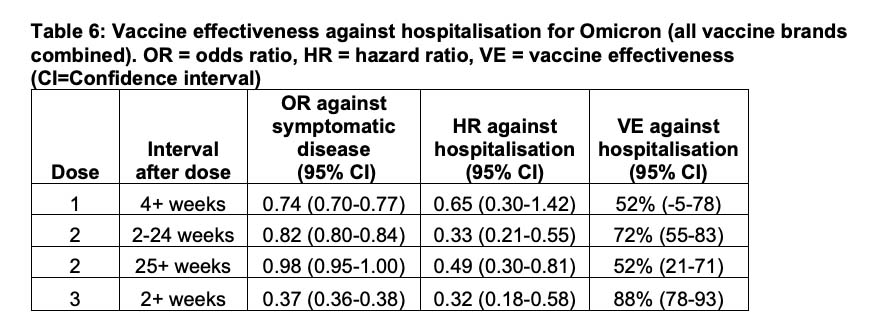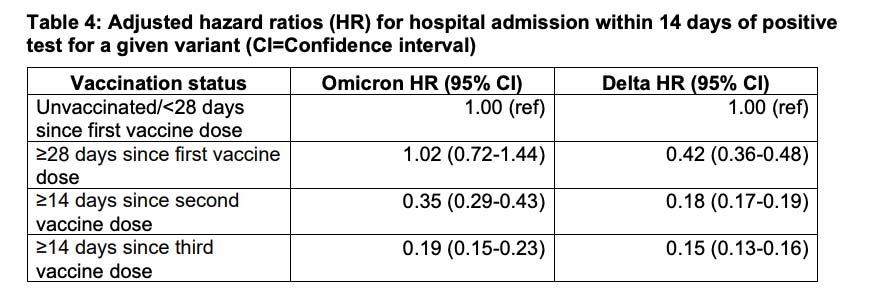A new report from the UK Health and Security Agency shows that vaccine boosters in the U.K. are providing people with better protection against hospitalization and deaths from the Omicron variant. Their report showed a reduced overall risk of hospitalization for Omicron compared to Delta, so data is confirming that this is a more mild variant of the virus. It also showed a substantial reduction in risk of hospitalization for Omicron cases after 3 doses of vaccine compared to those who are unvaccinated. However, it also shows that vaccine effectiveness and protection declines more rapidly when it comes to Omicron.
The most interesting chart in the study is this one below:

According to the study, the vaccine effectiveness (VE) was highest in the group with 3 doses. We can also see the effects of waning immunity, as the group with 2 doses and 25+ weeks had only 52% VE ( the same as a single dose and 4+ week). However, the 3 vaccine and 2+ weeks group had 88% VE.
Those who are vaccine hesitant however also note that it would take constant boosters to remain at the highest levels of protection. So, is it worth it to get vaccines if you frequently have to get injected? That’s a decision you should be able to make for yourself. At this stage, (and contrary to what mainstream media wants), most people are not overly frightened of contracting COVID. Especially a more mild version such with Omicron.
While the early data shows that Omicron is much less dangerous than than the Delta variant, it can still result in serious cases of Covid. There were 57 deaths attributed to Omicron in this study. There was no data presented however on how many of those that died had underlying conditions.
Considering how transmissible Omicron is, there will be many more people that end up catching the virus so hospitalizations and deaths will increase, albeit at a much lower rate than with Delta. The data from this study does indeed support that.
Here is an excerpt from the study summary:
Omicron cases, hospitalisation and deaths
The data cut off for analyses in this report is 29 December 2021. At this time, there were 198,348 confirmed cases of Omicron VOC-21NOV-01 (B.1.1.529) (hereafter referred to as Omicron), identified through sequencing or genotyping in England, and 451,194 probable cases, identified through S-gene target failure (SGTF). This does not represent the total number of Omicron infections or cases (approximately 30% of community PCR tests are performed using an assay that can detect SGTF); SGTF accounts for 93% of cases with an S-gene test on 29 December, this is the number of cases which can be classified as Omicron for comparative analyses. As of 29 December, a total of 815 individuals with laboratory-confirmed (sequencing, genotyping or SGTF) Omicron have been admitted or transferred from emergency departments in England.
Studies of hospitalisation and vaccine effectiveness (VE)
Two studies have been undertaken which examine the association between both variant and vaccination status and risk of hospitalisation. Study 1 is based on a larger dataset, approximately half a million Omicron cases, because it includes all cases diagnosed in the community and in the first day of hospital admission, and all age groups. Study 2 uses a smaller dataset because it is restricted to symptomatic cases diagnosed in the community, followed by a hospital admission, in part to reduce the impact of cases where coronavirus (COVID-19) is incidental to the admission but detected on routine hospital admission screening. It is restricted to ages 18 and over. The previous finding of reduced overall risk of hospitalisation for Omicron compared to Delta is confirmed by the updated Study 1. In addition, both studies find a substantial reduction in risk of hospitalisation for Omicron cases after 3 doses of vaccine compared to those who are unvaccinated, with overlapping estimate ranges. Both studies have been run on relatively small numbers of hospitalised cases and will require iteration. Despite the estimated reduction in hospitalisation risk and preserved vaccine effectiveness against hospitalisation, the very high SARS-CoV-2 variants of concern and variants under investigation in England: Omicron update 4 number of Omicron cases means that there may still be large numbers of admissions to hospital.
Here is another chart from the study, comparing unvaccinated to vaccinated against Omicron and Delta. Again, we see the lowest number in both groups for those that have had a third vaccine dose.

The risk of being admitted to hospital for Omicron cases was lower for those who had received 2 doses of a vaccine (65% lower) compared to those who had not received any vaccination. The risk of being admitted to hospital for Omicron cases was lower still among those
who had received 3 doses of vaccine (81% lower).
To sum up the study, the effectiveness of vaccines against symptomatic cases of COVID when it comes to the Omicron variant is significantly lower than compared to the Delta variant. We can clearly see that the protection it provides also wanes rapidly. However, people with three doses of vaccine clearly have a lower chance of being hospitalized or dying.
Is it worth getting constant boosters? What do you think? We’d like to hear in the comments below.